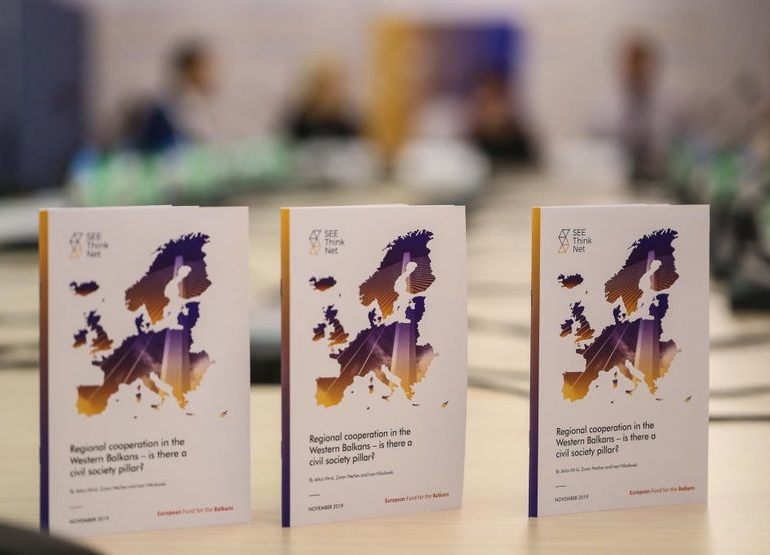
A promotion of the newest policy paper “Regional cooperation in the Western Balkans – is there a civil society pillar?” written by Jelica Minić, Zoran Nechev and Ivan Nikolovski was organized in the frames of the SEE Think Net project "Towards a sustainable regional cooperation Berlin process and beyond", supported by the Fund's Think and Link Regional Policy Programme. The event realized by the Institute for Democracy “Societas Civilis” Skopje (Coordinator of the SEE Think Net) took place on 27th November 2019, at the Regional Cooperation Council’s Conference Hall in Sarajevo, Bosnia and Herzegovina. It was opened by Ms Tanja Miščević, Deputy Secretary-General of the Regional Cooperation Council and Serbia’s former chief negotiator with the EU and Zoran Nechev, Head of the Centre for European Integrations at the Institute for Democracy “Societas Civilis” – Skopje (IDSCS) and Coordinator of the SEE Think Net. 
 Ms Mišević stressed the openness and readiness of RCC to support the regional cooperation of the civil society at the highest level and even deeper. Mr Nechev presented the work of the SEE Think Net to the Bosnian public and announced the plans for the upcoming North Macedonia – Bulgaria co-presidency with the Berlin Process in regards to the 2020 Think Tank and Civil Society fora. Ms Jelica Minić, Vice-President of the European Movement in Serbia, presented the findings as well as the policy recommendations of the policy brief, including 1) establishment of a database/ registry of regional civil society networks; 2. a wider analysis of CSO’s inclusion in the activities of regional organisations; 3) bolstering CSOs’ potential in improving strategic communication with EU institutions and EU Member States; and 4) organizing sectoral debates with civil society in the Western Balkans on how to improve their contribution in developing regional cooperation. During the event, which is part of the Towards a sustainable regional cooperation Berlin process and beyond project financially supported by the European Fund for the Balkans, Ms Minić reflected on the transport and energy projects within the connectivity agenda of the Berlin Process. Two infographics funded by EFB were presented to the guests from Sarajevo as well. Mr Ivan Nikolovski spoke about one of the analyzed case studies – the Migration, Asylum, Refugees Regional Initiative (MARRI). He added that even the organizations that work in sensitive and delicate fields – asylum, migration, human trafficking, such as MARRI, are opening up for closer and greater cooperation with the civil society organisations.
Ms Mišević stressed the openness and readiness of RCC to support the regional cooperation of the civil society at the highest level and even deeper. Mr Nechev presented the work of the SEE Think Net to the Bosnian public and announced the plans for the upcoming North Macedonia – Bulgaria co-presidency with the Berlin Process in regards to the 2020 Think Tank and Civil Society fora. Ms Jelica Minić, Vice-President of the European Movement in Serbia, presented the findings as well as the policy recommendations of the policy brief, including 1) establishment of a database/ registry of regional civil society networks; 2. a wider analysis of CSO’s inclusion in the activities of regional organisations; 3) bolstering CSOs’ potential in improving strategic communication with EU institutions and EU Member States; and 4) organizing sectoral debates with civil society in the Western Balkans on how to improve their contribution in developing regional cooperation. During the event, which is part of the Towards a sustainable regional cooperation Berlin process and beyond project financially supported by the European Fund for the Balkans, Ms Minić reflected on the transport and energy projects within the connectivity agenda of the Berlin Process. Two infographics funded by EFB were presented to the guests from Sarajevo as well. Mr Ivan Nikolovski spoke about one of the analyzed case studies – the Migration, Asylum, Refugees Regional Initiative (MARRI). He added that even the organizations that work in sensitive and delicate fields – asylum, migration, human trafficking, such as MARRI, are opening up for closer and greater cooperation with the civil society organisations. 
 After the presentation, a discussion followed where the participants talked about the experiences of the regional cooperation between the CSOs. The Bosnian public also provided useful recommendations on how regional cooperation in this respect could be improved. The next event is scheduled for December 6, 2019 in Skopje, where SEE Think Net will host a policy discussion "The lessons learned from Poznan 2019: Ahead of 2020 North Macedonia-Bulgaria Co-Presidency with the Berlin Process". Check the agenda of this upcoming event. (Text by: IDSCS) Photo credit: Jasmin Šaković
After the presentation, a discussion followed where the participants talked about the experiences of the regional cooperation between the CSOs. The Bosnian public also provided useful recommendations on how regional cooperation in this respect could be improved. The next event is scheduled for December 6, 2019 in Skopje, where SEE Think Net will host a policy discussion "The lessons learned from Poznan 2019: Ahead of 2020 North Macedonia-Bulgaria Co-Presidency with the Berlin Process". Check the agenda of this upcoming event. (Text by: IDSCS) Photo credit: Jasmin Šaković






